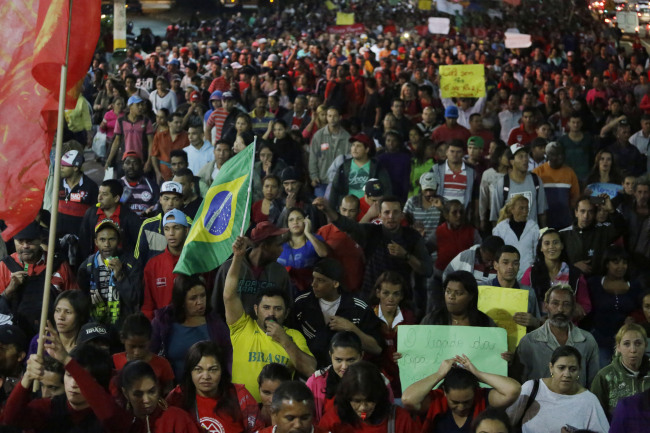Fresh protests hit Brazil eight days from World Cup
By Korea HeraldPublished : June 5, 2014 - 20:32
SAO PAULO (AFP) ― Sao Paulo underground workers announced an open-ended strike amid fresh protests Wednesday, hitting World Cup preparations as Brazil defended itself against criticism over chronic delays and soaring costs.
Subway workers in Brazil’s business hub of 20 million people voted for an open-ended strike from midnight that could strand 4.5 million passengers and unleash commuter chaos.
Brazil has been hit by a wave of strikes and protests ahead of the World Cup and elections in October.
Calling for higher pensions, about 400 retired military police and their relatives earlier rallied outside Sao Paulo’s Corinthians Arena, the stadium that will host the World Cup opening match on June 12.
They blocked roads in the area with 15 buses and several smaller vehicles and caused traffic jams stretching several kilometers.
Subway workers in Brazil’s business hub of 20 million people voted for an open-ended strike from midnight that could strand 4.5 million passengers and unleash commuter chaos.
Brazil has been hit by a wave of strikes and protests ahead of the World Cup and elections in October.
Calling for higher pensions, about 400 retired military police and their relatives earlier rallied outside Sao Paulo’s Corinthians Arena, the stadium that will host the World Cup opening match on June 12.
They blocked roads in the area with 15 buses and several smaller vehicles and caused traffic jams stretching several kilometers.

Another 4,000 protesters rallied by the Homeless Workers’ Movement, a mainstay of the anti-World Cup protests that have gripped the country over the past year, were marching toward the same area.
Protesters say the more than $11 billion being spent on the tournament should have been used to help address urgent needs in education, health care and transport.
A year ago, a million protesters flooded the streets during the Confederations Cup, a World Cup dress rehearsal.
The protests turned violent at times, overshadowing the tournament and raising fears of a repeat this year.
The government has also faced criticism for chronic delays and cost overruns.
Workers are still scrambling to finish five of the 12 host stadiums, including Corinthians Arena, which has not had all its seats installed.
Organizers have shelved much of the other infrastructure they had originally promised, from roadworks to a high-speed train to subway and monorail lines.
The latest protests came after Brazilian President Dilma Rousseff defended her government’s preparations for the tournament and said FIFA bore part of the blame for the spiralling public bill.
The leftist leader, who plans to seek reelection in October, said the sport’s global governing body had assured Brazil that host stadiums would be built with private money.
But the government eventually realized private sector investment would not even cover “half a stadium,” and provided most of the financing itself, Rousseff told journalists at a dinner Tuesday at the presidential residence in Brasilia.
She insisted that the vast majority of public spending related to the tournament was “for Brazil” over the long-term and not limited to the World Cup.
Hosting the tournament spurred many cities to undertake badly needed public transport projects ― though Rousseff acknowledged many of them would not be completed before the World Cup.
-
Articles by Korea Herald









![[Today’s K-pop] BTS pop-up event to come to Seoul](http://res.heraldm.com/phpwas/restmb_idxmake.php?idx=644&simg=/content/image/2024/04/17/20240417050734_0.jpg&u=)
![[Graphic News] More Koreans say they plan long-distance trips this year](http://res.heraldm.com/phpwas/restmb_idxmake.php?idx=644&simg=/content/image/2024/04/17/20240417050828_0.gif&u=)







![[KH Explains] Hyundai's full hybrid edge to pay off amid slow transition to pure EVs](http://res.heraldm.com/phpwas/restmb_idxmake.php?idx=652&simg=/content/image/2024/04/18/20240418050645_0.jpg&u=20240419100350)

